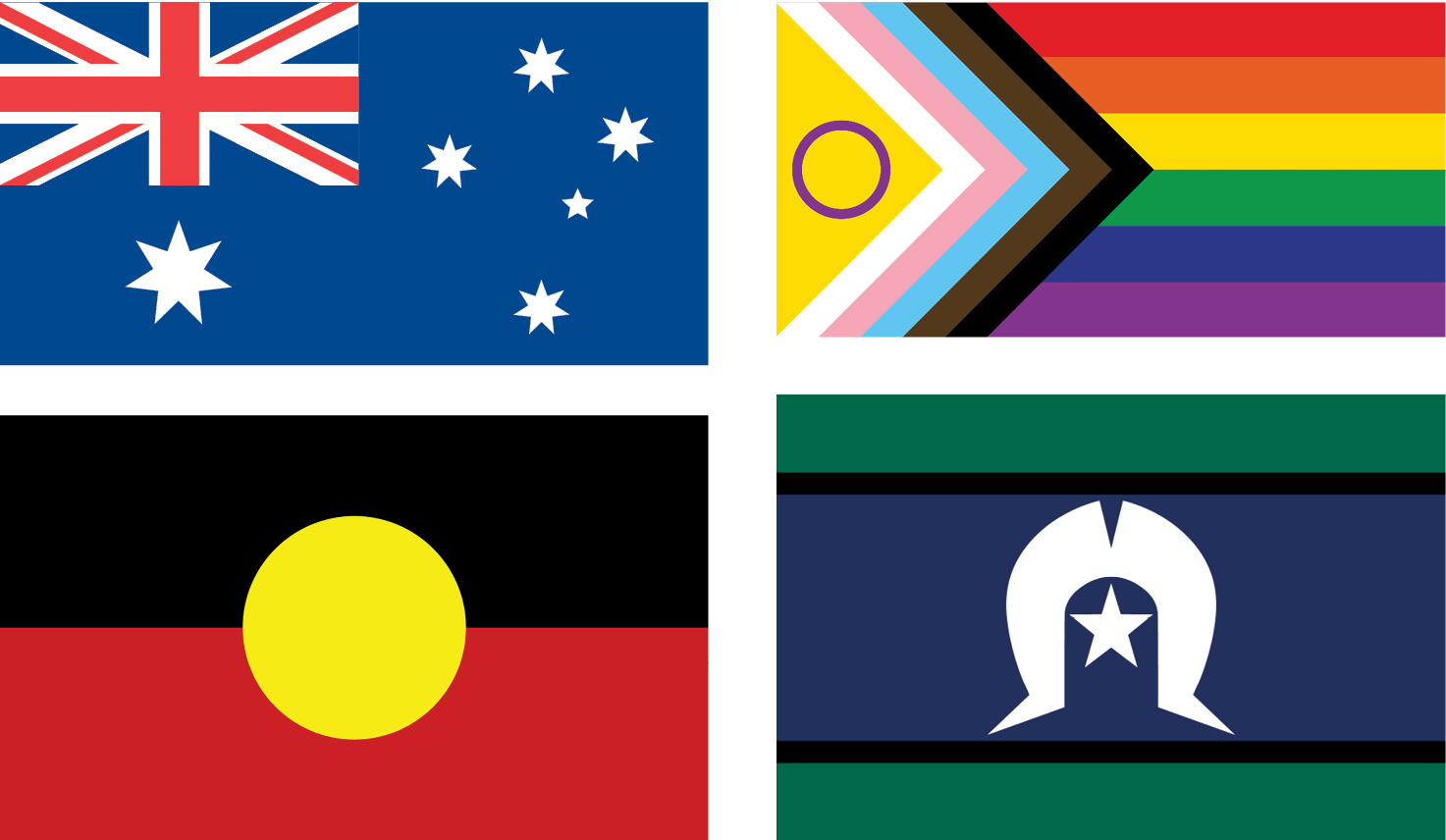Apr 2, 2019
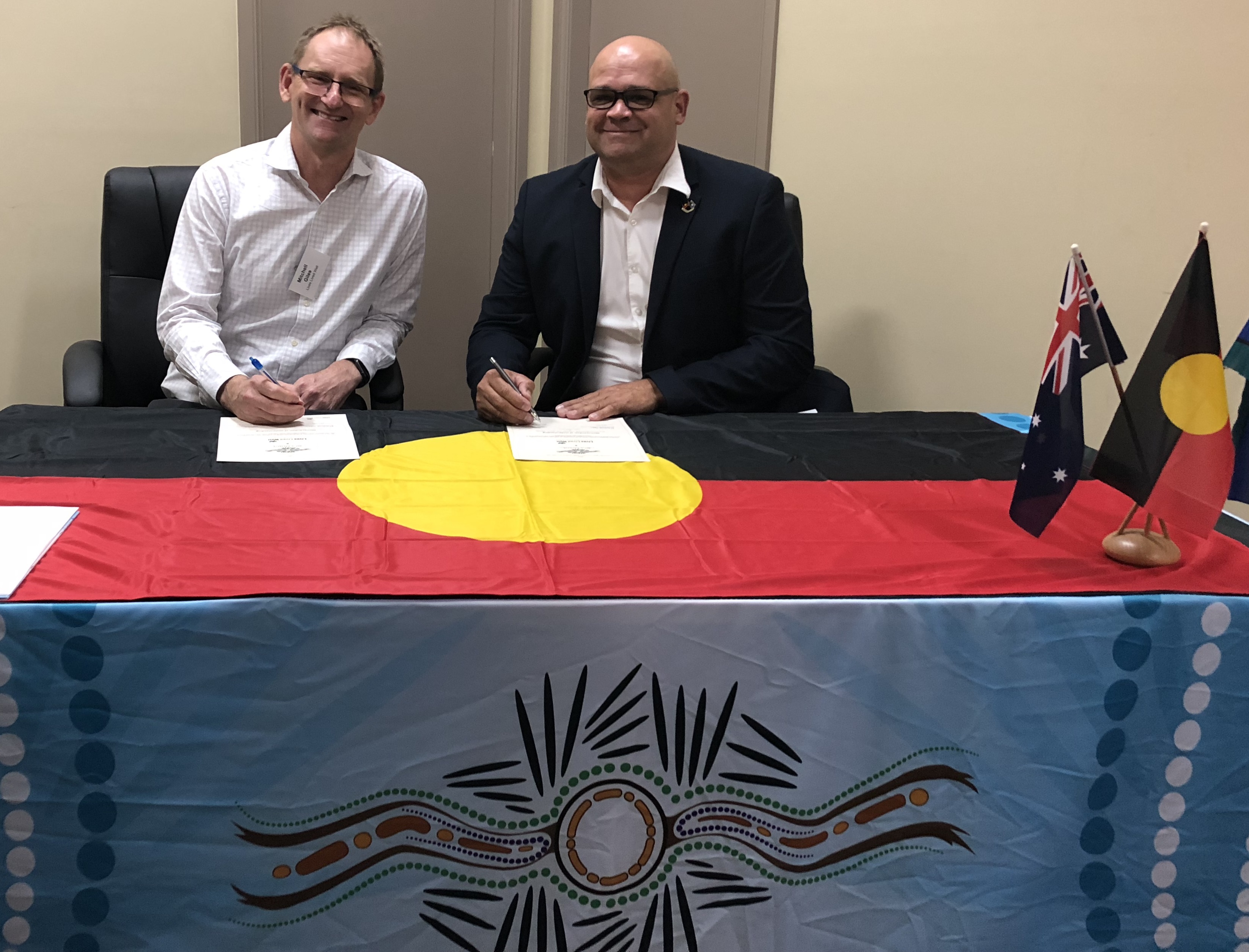
Committed to partnership: Lives Lived Well CEO, Mitchell Giles and Bila Muuji CEO, Phil Naden.
Lives Lived Well has teamed up with Bila Muuji Aboriginal Corporation Health Service to build capacity and professional development among regional health service providers through the Lives Lived Well Drug and Alcohol Network (previously the Murdi Paaki Drug and Alcohol Network).
The partnership was announced in Dubbo on 28 February, with CEOs of both organisations – Mitchell Giles and Phil Naden – signing a commitment to partnership to address health inequality in local communities.
Bila Muuji works with its members, including a large number of medical services across the region, to support the provision of improved services, addressing not just physical needs, but social, emotional and cultural well-being as well, for individuals and communities.
As a specialist alcohol and drug support organisation, we’ll bring our expertise to western NSW, by working to build capacity and professional development among regional health service providers.
Through the partnership both organisations will be stronger in their shared commitments, and are looking forward to realising genuine improvements for Aboriginal and Torres Strait Islander peoples.
Apr 2, 2019

We know problem gambling is a major social issue but how does it intersect with substance misuse?
Lives Lived Well’s Gerard Moloney has been presenting Screening for Problem Gambling workshops across Queensland for more than two years. He says for many people, there is intense stigma related to acknowledging a gambling problem.
“People are far more comfortable discussing an issue with drugs or alcohol than talking about a gambling habit,” he said.
Research suggests a strong link between alcohol and drug use, and problem gambling. Around 75 percent of problem gamblers also have had a problem with alcohol, while 38 percent of problem gamblers have had a problem with drugs. Between 20 and 30 percent of people receiving treatment for substance misuse also have a moderate or severe gambling addiction.
With funding from the Department of Communities, Disability Services and Seniors, we began delivering face-to-face and online workshops to raise awareness of this link among AOD support and other community and healthcare workers and how to use the Problem Gambling Severity Index (PGSI) as a screening tool.
Why screen for problem gambling?
Gerard says the anecdotal evidence he hears as he travels around the state lines up with the research, which shows that any level of gambling, even low levels, is leading to gambling-related harms, making early intervention more imperative.
Having AOD support workers screen their clients for problem gambling can help identify this problem before it becomes severe.
Studies by our research partner, The University of Queensland, along with PGSI results gathered within Lives Lived Well, indicate more than 40 per cent of people presenting with AOD issues are already experiencing gambling-related harm.
“The people at highest risk of developing a gambling problem are men aged between 18 and 34,” Gerard said. “Older Australians are also at risk – we see this issue in towns with a high concentration of retirees.”
Why has gambling been in the background?
Gerard says there are a number of contributing factors: clients experience high levels of shame and may not disclose a gambling problem, and they also may not believe their gambling is contributing to problems in their life; for clinicians, there are competing priorities which mean they may not think to ask about gambling or believe it could be a serious issue for someone in crisis.
“The shame and secrecy felt by the client interacts with the tendency of clinicians to minimise gambling as an issue, to keep problem gambling a background issue that often remains unexplored. By introducing the PGSI to clinicians, we’re aiming to provide a practical tool to facilitate conversations and reduce the stigma around gambling problems.”
Lives Lived Well’s Gambling Intervention team is available to present the free workshop in workplaces across Queensland. For enquiries please call 1300 727 957 to speak with the program coordinator, Richie Wilson or email [email protected]
To undertake the online training, simply register for free at https://llwcourses.learnupon.com/store
If you need support with the online workshop, email: [email protected]
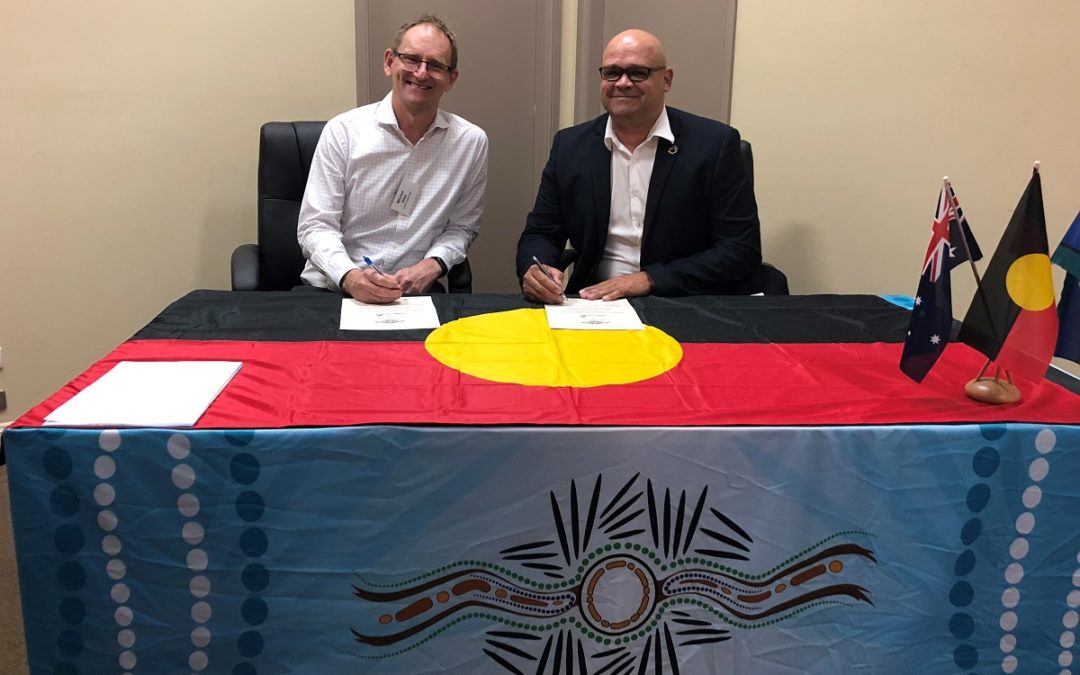
Feb 28, 2019
Promising things happening in western NSW…
A partnership between two not-for-profit health organisations will go along way towards forging better health and well-being for Aboriginal and Torres Strait Islander peoples, families and communities in West and Far West NSW.
In cementing the partnership at a celebratory event today, Thursday 28 February 2019, Lives Lived Well and the Bila Muuji Aboriginal Corporation Health Service asserted their joint commitment to work together to address health inequality in local communities.
Bila Muuji works with its members, including a large number of medical services across the region, to support the provision of improved services, addressing not just physical needs, but social, emotional and cultural well-being as well, for individuals and communities.
Lives Lived Well as a specialist alcohol and drug support organisation, brings its expertise to western NSW, by working to build capacity and professional development among regional health service providers through its Lives Lived Well Drug and Alcohol Network.
Together, they will be stronger in their shared commitments, and with the valued, ongoing support of governments, local PHNs and other community organisations, are looking forward to realising genuine improvements for Aboriginal and Torres Strait Islander peoples.
Bila Muuji’s CEO Phil Naden said that he was very excited about partnering with such a great organisation as Lives Lived Well. “Our partnership agreement means that both our organisations are committed to the health and wellbeing of Aboriginal and Torres Strait Islander Peoples within our regional footprint,” he said.
“This partnership with Lives Live Well is the start of a new beginning for Bila Muuji and with the collective impact framework that Bila Muuji work under with multi organisations and universities, we are embracing this partnership with anticipation that both our organisations are working in the best interest of our communities in the West and Far West Regions of NSW.”
Lives Lived Well CEO Mitchell Giles also enthusiastically welcomed the partnership with such an inspiring organisation as Bila Muuji. “We are committed to working alongside Bila Muuji towards building workforce skills and development in the region to ensure people experiencing problems with drugs and alcohol can get the support they need within their community,” Mr Giles said.
“We couldn’t be happier with our relocation to Dubbo, sharing a premises with Bila Muuji in support of our new partnership and positioning ourselves closer to our networks and the communities we work to support.”
For all media enquiries contact:
Michelle Saftich – Marketing & Media Officer
e [email protected] or [email protected]
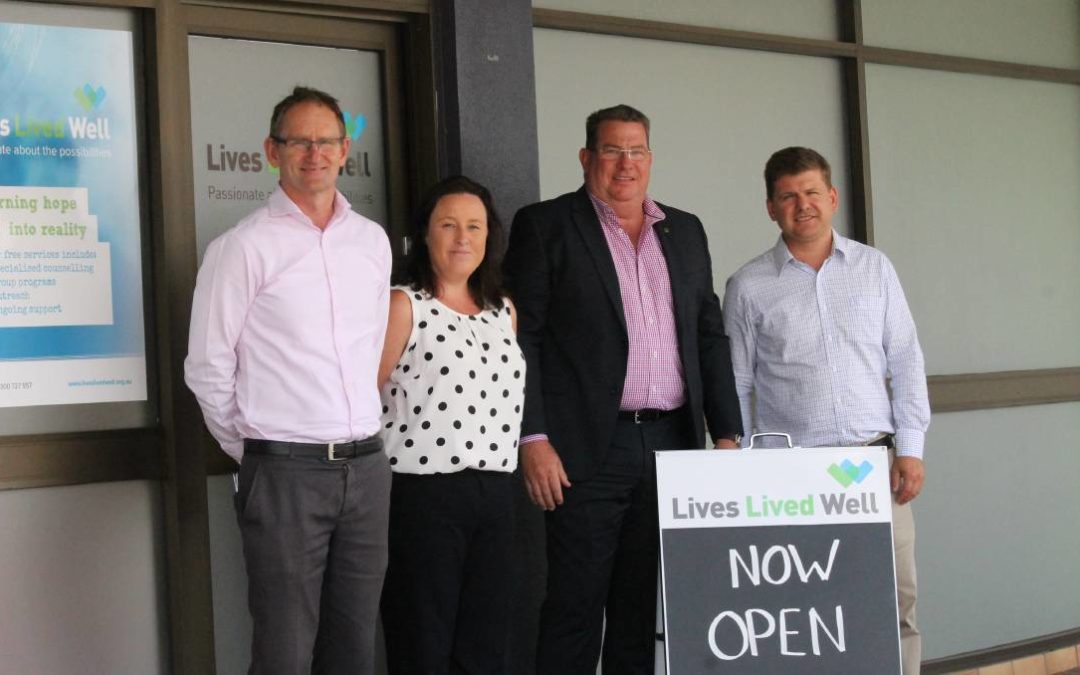
Jan 31, 2019
LLW CEO Mitchell Giles, Team Leader Ronelle Waring, Scott Buchholz MP and Jon Krause MP
Lives Lived Well’s official opening of a new space in Beaudesert will allow for an increase in drug and alcohol support to the community, including the running of group programs.
Moving into a new and larger space, the Lives Lived Well team will be able to increase their counselling support in the area and be able to offer group work through the Smart Recovery program as well as family information sessions through the Breakthrough for Family program.
Lives Lived Well CEO Mitchell Giles said the new space would allow for more support for both individuals and families in the Beaudesert community. “In 2018, we supported about 80 people, with our team operating out of Illoura Carinity Care,” he said. “Opening our own space means we can be available more often and, with more space, can run groups and information sessions, increasing the number of people we can support.”
Mr Giles said: “Lives Lived Well is able to offer these free supports in Beaudesert thanks to the support of the Brisbane South PHN through the Australian Government’s PHN program and the Queensland Government, for which we are very grateful.”
Speaking at the opening, Federal Member for Wright, Scott Buchholz MP said Lives Lived Well provided essential community support for those impacted by drugs, alcohol and mental health issues. “Lives Lived Well provides a respected and essential service for our community here in Beaudesert and across the Scenic Rim,” Mr Buchholz said.
“The opening of their new office today shows their value to our local community and the importance of work they do in getting lives back on track following the impact of drugs, alcohol and mental health.”
Also welcoming the launch, Jon Krause, State Member for Scenic Rim, said that the Lives Lived Well team would help cover a missing link in social services for the Beaudesert district by providing much needed support for the wellbeing of those whose lives have been affected by substance use.
“The Scenic Rim Electorate needs its fair share of services and the opening of a new, larger space for Lives Lived Well shows the need and support that networks like this have in our community,” Mr Krause said.
Lucille Chalmers, Brisbane South PHN’s General Manager of Commissioned Programs, said evidence shows access to specialist alcohol and drug (AOD) treatment plus improved coordination of care and increased early intervention delivers positive impacts not only for the individual, but for the community and the broader health system.
“Brisbane South PHN recognises the challenges faced by individuals experiencing harm from problematic substance use, and the people who support them. Beaudesert is one of our priority locations, as identified in our 2018 Needs Assessment, so we are very pleased to be able to support extending services in the region,” she said.
For media inquiries, email Lives Lived Well Marketing and Communications Team Leader, Michelle Saftich on [email protected]

Dec 20, 2018
Lives Lived Well would like to wish everyone a safe and happy holiday season and New Year.
We hope that this is a positive time, that allows you to move into the new year refreshed and revitalised. Though we also acknowledge that this period may be difficult for some.
If this is the case, we urge you to practice self-care and if in a crisis, to reach out to services such as Lifeline on 13 11 14.
Our operating hours will be changing over this time, with most services closing from Saturday 22 December 2018 and opening again on Wednesday 2 January 2019.
Some will continue to operate, including our residential programs: Logan House, Mirikai and Shanty Creek, our Gold Coast community services and headspace Southport. The Lives Lived Well Specialist Centre will be open on Monday 24 December.
Our 1300 727 957 contact number will also take inquiries during usual office hours (except public holidays).
We’d like to thank the community and all of our supporters for all you’ve done with us over the course of 2018. We look forward to creating positive change with you once again in 2019.





